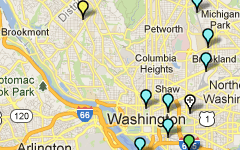“Business Case for Transit” Study Underway

Image from Downtown DC BID
In our discussions about the costs of Metro, it’s worth stepping back and considering the regional benefits our transit system provides – beyond simply another way to get from Point A to Point B. Against a backdrop of funding needs, a crucial question is, “how does the region benefit from continued funding of Metro?”
Since the WMATA Compact was signed in 1967, we have built a 106-mile heavy rail network, the bus and paratransit systems now cover 1,500 square miles, and together we make around 1.2 million trips on the system every day. Our choice to build and use transit has had broad impacts on the region: it has changed the way land is developed, where businesses choose to locate, how the economy grows, how families get around and settle in livable neighborhoods, how we impact the environment, and more.
Many of Metro’s partners recognize this, and increasingly call for introducing new kinds of metrics into transportation planning. The Greater Washington 2050 Coalition’s Region Forward plan identified goals of accessibility, sustainability, prosperity, livability for regional planning. The U.S. Department of Transportation’s Partnership for Sustainable Communities and the Federal Transit Administration’s guidance for New Starts grant applications aims to ensure that federal investments in infrastructure will protect the environment and develop livable communities. Metro’s own Regional Transit System Plan on this blog has similar goals.
So, Metro is beginning a study to measure these benefits of our services. Over the coming months, we will be engaged in two primary tasks:
- What does Metro deliver for communities in the Washington region? We will identify a broad universe of benefits – even those that are difficult or impossible to measure.
- By how much does the Washington region benefit from Metro? We will quantify Metro’s impact on the region for a smaller subset of metrics.
Along the way, we may encounter a trade-off between more traditional and easily-calculable measures of transit benefits, like avoided parking, and more innovative but perhaps uncertain measures, such as public health and livability.
Building and sustaining our transit system requires significant financial resources. But in return, Metro also provides a range of benefits – economic, environmental, mobility, and others. Evaluating these benefits will allow Metro to better make the “Business Case for Transit.”


One of the largest concerns about the expansion of public transportation are not the costs of building the system but rather the cost of operating. The transportation systems become unionized and the costs become unmanageable. The Washington Metro is a prime example. Money is taken from the capital budget to pay for unusually large (at least compared to the private sector) benefits, primarily pension and health care. Thus, the system is not maintained, and it needs an ever escalating tax burden and user fees to maintain. Before we expand public transportation, we need a way to keep out unions or at least limit their damage. Otherwise, public transportation will never be a success.
I suggest looking at Metro’s effect on the regional economy’s “balance of payments.” Not only do riders and taxpayers save money when people use transit instead of driving (lower per-mile costs, plus Metro enables development patterns with shorter trips), but more of the money they do spend stays in the community.
Drivers send dollars to Michigan for cars and to Texas and Saudi Arabia for gas. A much higher percentage of the transit budget stays in the community as wages. Even construction has a higher labor component for rail lines than for highways.
@jim
Jim, you seem to think that unions ARE the problem when they’re merely citizens trying to eek out a good living. Operating buses and trains requires skill and not everyone is cut out for the job. We need highly skilled and motivated individuals to keep our system running smoothly.
And no, I have no affiliation with ATU.